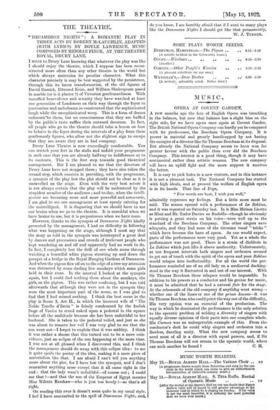M USI C.
OPERA AT COVENT GARDEN.
A FEW months ago the fate of English Opera was trembling in the balance, but now that balance has a alight bias on the right side, for we have opera once again at Covent Garden. The British National Opera Company can hardly yet be compared with its predecessor, the Beecham Opera Company. It is poorer in material and greatly handicapped by not having the energies of a director like Sir Thomas Beecham at its disposal. But already the National Company seems to have won far greater favour with the public than ever did the Beecham Company. This interest is a good thing, though it may have sentimental rather than artistic reasons. The new company will have an uphill fight and the more support it receives the better.
It is easy to pick holes in a new venture, and in this instance it is not a pleasant task. The National Company has started with high ideals, and at present the welfare of English opera is in its hands. That line of Pope, " Few words are best, I wish you well,"
admirably expresses my feelings. But a little more must be said. The season opened with a performance of La Babas, and it was repeated on Saturday last. In it Miss Miriam Licette as Mimi and Mr. Tudor Davies as Rudolfo—though he obviously is putting a great strain on his voice—were well up to the standard of the Beecham Company. The other singers were adequate, and they had none of the tiresome vocal " tricks " which have become the bane of opera. As one would expect, parts of the performance were very good. Yet as a whole the performance was not good. There is a strain of diablerie in La Bohgme which just lifts it above mediocrity. Unfortunately, at too frequent intervals both singers and orchestra seemed to get out of touch with the spirit of the opera and poor Bohime would relapse into ineffectuality. For all the world the per- formance reminded me of an old lady on a mediaeval ducking- stool in the way it fluctuated in and out of our interest. With Sir Thomas Beecham these relapses would be impossible. In addition to his powers as a conductor and his genius for music, it must be admitted that he had a natural flair for the stage. At the rehearsals of the old company if anything went wrong— whether one of the limes or one of the prima donnas—it was Sir Thomas Beecham who could point the way out of the difficulty, His very egoism was an essential of the production. The way in which he dominated the performance is the only solution to the operatic problem of welding a diversity of singers with equally diverse opinions of their parts into one complete whole. His Carmen was an unforgettable example of this. From the conductor's desk he could whip singers and orchestra into a flawless, dazzling unity. What the new company seems to need most of all is a director with equal powers, and, if Sir Thomas Beecham will not return to the operatic world, where


































 Previous page
Previous page